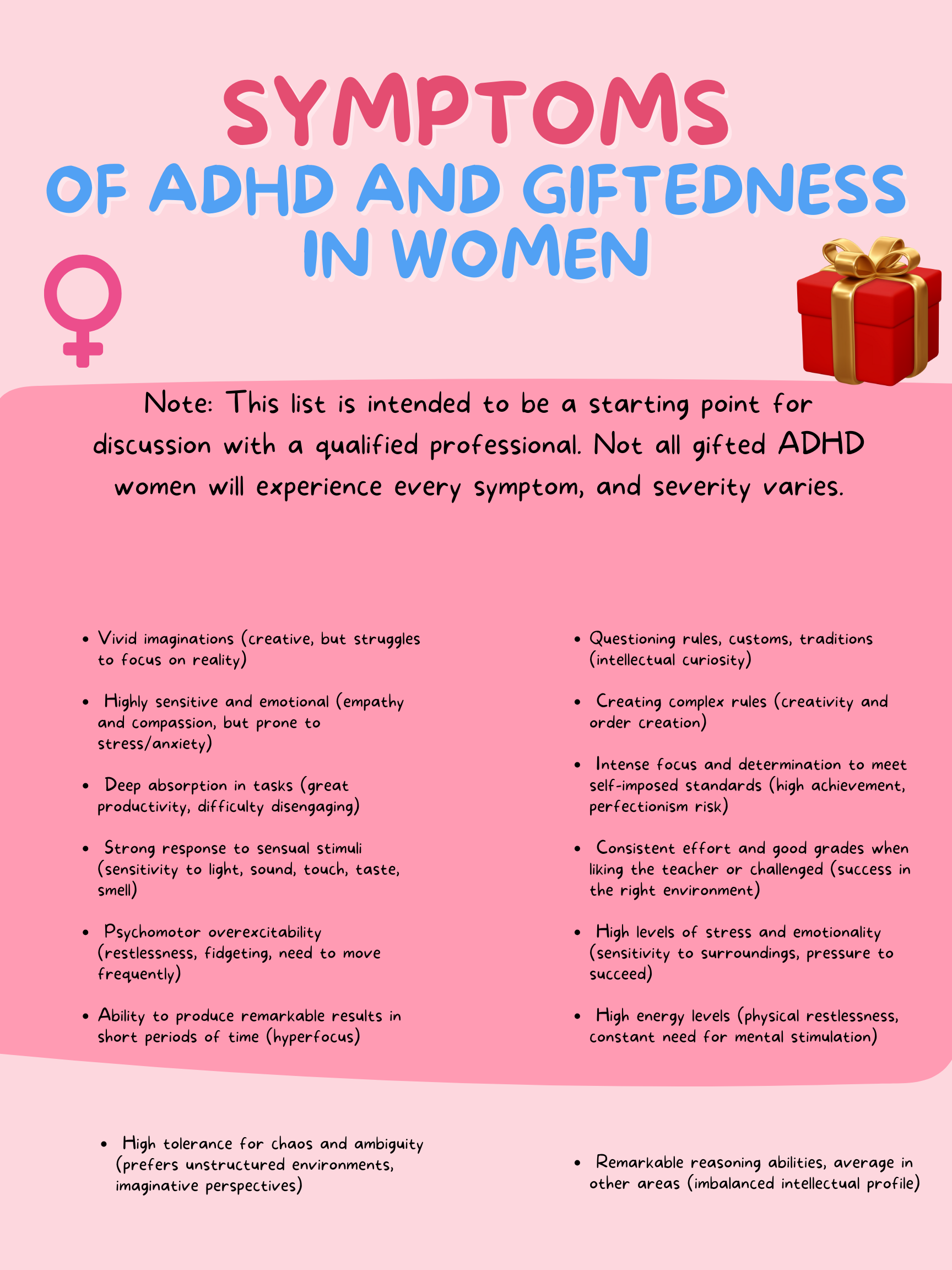Gifted and ADHD Women: The Stregnths and Challenges
Understanding Twice-Exceptionality: Are You a Gifted ADHD Women?
Being “twice-exceptional” means you’re both gifted and have ADHD, which creates a combination of powerful strengths and real challenges. Many twice-exceptional women find this mix to be both exciting and demanding.
Giftedness refers to your natural abilities to think deeply, learn quickly, or solve problems in creative ways. For example, you might pick up new skills faster than most people or notice details others miss.

ADHD, on the other hand, affects attentional control, energy, emotional regulation, organization, and time management. ADHD can make it harder to keep track of your responsibilities, follow routines, or stay engaged in tasks that don’t interest you. It can also strengthen emotions and increase sensitivity to what others say or do.
This combination of giftedness and ADHD creates a unique experience that makes it hard to fit into and feel like you belong in traditional environments. You might struggle at school and work, where structure and routines are expected.
Twice-exceptional women have incredible insights and stregnths but find their approach and thinking are devalued. Understanding how giftedness and ADHD interact in you can be key to building a fulfilling life.
Giftedness Symptoms in ADHD Women Checklist
- High tolerance for chaos and ambiguity (prefers unstructured environments, imaginative perspectives)
- Ability to produce remarkable results in short periods of time (hyperfocus)
- High energy levels (physical restlessness, constant need for mental stimulation)
- Vivid imaginations (creative, but struggles to focus on reality)
- Highly sensitive and emotional (empathy and compassion, but prone to stress/anxiety)
- Deep absorption in tasks (great productivity, difficulty disengaging)
- Strong response to sensual stimuli (sensitivity to light, sound, touch, taste, smell)
- Psychomotor overexcitability (restlessness, fidgeting, need to move frequently)
- Questioning rules, customs, traditions (intellectual curiosity)
- Creating complex rules (creativity and order creation)
- Intense focus and determination to meet self-imposed standards (high achievement, perfectionism risk)
- Consistent effort and good grades when liking the teacher or challenged (success in the right environment)
- High levels of stress and emotionality (sensitivity to surroundings, pressure to succeed)
- Remarkable reasoning abilities, average in other areas (imbalanced intellectual profile)

Balancing Your Strengths and Challenges
Living as a twice-exceptional woman means noticing how your gifted and ADHD traits interact.
You might think quickly, feel curious about many things, and come up with creative ideas. However, ADHD can make it hard to stay organized, manage time, or stick to routines the way you are expected to in the neurotypical world. Sometimes, this might feel like a struggle between your big ideas and the everyday tasks needed to make them happen.
For example, you might have a great idea for a project but struggle to complete it because of time management or organization challenges. Learning how your brain works can be a turning point. It helps you recognize your strengths and challenges and find ways to make life easier and more enjoyable.
Unique Experiences of Twice-Exceptional Women
Twice-exceptional women also often face extra social pressures. Women are sometimes expected to “fit in,” stay organized, and not stand out too much. This can make it harder to accept and embrace the unique parts of being twice-exceptional and a radically different thinker.
Masking your traits and differentness leads to feeling exhausted and burnt out.
Many gifted ADHD women share feelings of being “not good enough” or “too much,” even when they are doing their best. By talking openly about these experiences, we can increase understanding and support for twice-exceptional women. You share this in common with other ADHD women, and all neurodivergent people.
Embracing Self-Understanding and Self-Acceptance
Self-understanding and acceptance are essential for thriving as a twice-exceptional woman. Rather than feeling like something is “wrong” with you, it helps to realize that your brain simply works in its way.
This can open the door to greater self-compassion, where you explore what genuinely helps you feel focused, engaged, and fulfilled. Learning to respect your boundaries, needs, and natural rhythms can make a big difference in building a balanced, satisfying life.
Common Cognitive and Behavioral Patterns in Twice-Exceptional Women
If you’re gifted and ADHD, you may notice specific traits that shape your day-to-day life. Here are some common ones:
- High Intelligence: You might learn quickly, remember details easily, and enjoy thinking through complex ideas. But traditional environments can feel limiting since ADHD can make it harder to stay organized or manage time, even if you understand the material well.
- Creative and Imaginative Thinking: You likely enjoy exploring new ideas and finding unique ways to solve problems. However, routines or repetitive tasks might feel tedious or hard to stick with.
- Inconsistent Attention Paired with Hyperfocus: ADHD can make it hard to focus on things you find boring, but when something truly interests you, you can become so absorbed that hours pass without you noticing. This combination of distraction and intense focus is common among twice-exceptional people.
- Asynchronous Development: Your thinking abilities may be advanced, but your emotional or social skills may develop differently. This “out of sync” feeling can make it hard to relate to others sometimes, leading to feeling frustrated or isolated.
Emotional and Behavioral Traits Many Twice-Exceptional Women Notice
Your emotional and behavioral patterns can also affect your life in meaningful ways. Many twice-exceptional women describe these traits:
- High Energy: You might feel restless and enjoy active engagement, but traditional settings can feel limiting if they don’t allow much movement or change.
- Impulsivity: You’re quick to act on new ideas, sometimes jumping into projects without a complete plan. This can lead to creative breakthroughs but also to occasional missteps.
- Emotional Sensitivity and Intensity: You may feel emotions deeply and be sensitive to feedback from others. This can help you connect well with people, but it can also make stressful situations feel more intense.
- Perfectionism and Self-Criticism: Setting high standards is common, but ADHD traits like forgetfulness or disorganization can create frustration. Practicing self-compassion can help reduce the pressure to be perfect and allow you to appreciate your progress.
Social and Interpersonal Traits
Socially, being twice-exceptional may mean you feel “out of sync” with others. Many gifted ADHD women experience:
- Difficulty with Social Norms and Cues: Your unique interests or way of thinking might make some social interactions challenging, especially with people who don’t share your interests.
- Desire for Meaningful Relationships: You may feel more fulfilled by deep, lasting relationships rather than casual ones. Twice-exceptional people often thrive when surrounded by people who value their perspectives.
- Need for Intellectual Stimulation: Engaging conversations and shared values give you energy. Finding people who understand you and respect your interests can boost your well-being and confidence.
Practical Tips for Thriving as a Gifted ADHD Woman
As a twice-exceptional woman, thriving means finding ways to align your strengths with practical strategies. Here are some tips:
- Embrace Your Creativity: Use your unique way of thinking to solve problems and approach challenges creatively.
- Focus on Progress Over Perfection: Pace yourself and remember that small improvements count as progress. This helps manage ADHD traits while reducing the pressure of perfectionism.
- Build a Support Network: Connect with people who understand and appreciate your neurodivergent perspective and value your individuality.
- Balance Structure and Flexibility: Create routines that offer structure but are flexible enough to keep life interesting. This balance can help you manage both the need for stability and the ADHD need for variety.
Wrapping Gifted and ADHD Women
Being a twice-exceptional woman means having a unique mix of strengths and challenges. Recognizing and embracing these parts of yourself can help you create a life that honors your gifts and how your brain works. Every Gifted ADHD woman has something unique to offer the world, and by practicing compassion and self-understanding, you can build a life that reflects your extraordinary potential.
External Sites
-
- Link out to Understood, which is an excellent organization with many articles on twice exceptionality.
- The ADHD Palooza workshop on Giftedness and ADHD women
Research I consulted for writing this article
-
- Antshel, K. M. (2008). Attention-deficit hyperactivity disorder in the context of a high intellectual quotient/giftedness. Developmental Disabilities Research Reviews, 14(4), 293–299. https://doi.org/10.1002/ddrr.34
- Mullangi, S. & Jagsi, R. (2019) Imposter Syndrome: Treat the cause, not the symptoms.
- JAMA, 322 (5), 403-404. DOI: 10.1001/jama.2019.9788.
- Popovic, A. (2011). Four women’s perceptions of living a lifetime with ADHD (Master’s project). Queen’s University, Faculty of Education.
- Williams, J. (2024). Raising their voices: Lived experiences of gifted women with ADHD (Doctoral dissertation). University of Denver, Morgridge College of Education.
- Young, C. (2014). An exploration of the learning strategies used by women who disclose with a formal diagnosis of Attention Deficit Hyperactivity Disorder (ADHD) in the context of higher education (Master’s thesis). Macquarie University, Faculty of Human Sciences.



